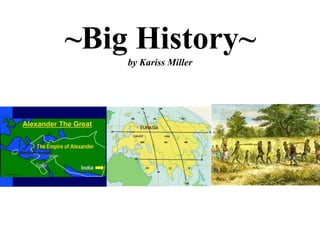
Ancient Leaders & Empires Compared
- 1. ~Big History~by Kariss Miller
- 2. Peoples & Empires Alexander the Great became King of Macedonia and conquered much of Asia, as he had a great desire to conquer Greece & Persia. As head of the Greek Army, Alexander was perhaps one the of greatest leaders of all time. Alexander was educated by Aristotle in various areas of war, critical thinking, and politics. Sadly Alexander expired in his early 30’s due to complications with typhoid fever.
- 3. Peoples & Empires Napoleon was one of the greatest military commanders in history with his personality & genius, he dominated Europe in the 1800’s. In the early 1800’s Napoleon would become the Prime Consul of France; reorganizing both the Army and the law. In 1804 Napoleon would become the Emperor of France, but little did he know the defeat that would follow and his exile for a few years. Napoleon would experience various “rises & falls” during the 1800’s with regard to the Prussians, Austria, etc. And an eventual defeat of the French Army during the Battle of Waterloo. Napoleon died in 1821.
- 4. Peoples & Empires Xerxes the Great was the King of Ancient Persia 486-465BC. Xerxes was the successor of his father, Darius. The death of his father prompted Xerxes in the invasion of Greece. Xerxes was assassinated in 465. This was thought to be ordered by one of his sons who would succeed him.
- 5. Guns, Germs, & Steel Guns is referring to the various European nations conquering others to maintain dominance and superiority with regard to politics, environment, technological advances, people, etc.
- 6. Guns, Germs, & Steel Germs is referring to disease being rampant and attacking various populations and consequently making it easier for other nations to attack and control them. Why were some diseases almost immune when it came to the Euros and Asians, while these same diseases nearly wiped-out populations in the Americas?
- 7. Guns, Germs, & Steel Steel is referring to strong military presence and organized government. Studies maintain that Eurasia had many characteristics which gave them superiority over the Americas. Environmental factors were critical and involved the geography, plenty of food, location, population, trade, livestock, farming, its’ craftsman which would account for technological advances and economy.
- 8. The Origins & Nature of New World Slavery African slaves mixed with others in the Ancient World, however, Arabs were the first to make use of African slaves and classify them as the lowest form of humankind. Many were transported by sea, and via camel caravans.
- 9. The Origins & Nature of New World Slavery Demand for various commodities such as sugar, tobacco, spices, etc. grew and the demand for slaves grew for labor intensive crops. Sexual imbalances would occur and men outnumbered women; this resulting in the Muslims castrating the male slaves. Slaves were considered critical in the New World, by the 1500’s.